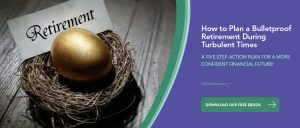Retirement Planning CT: Can I Still Retire Post-COVID-19?
As the world transitions to life post-pandemic, some things will never be the same. For a lot of people, that’s retirement.
According to recent reports, about 50 percent of working adults say the economic consequences of COVID-19 will make it harder for them to achieve their financial goals. Of these people, 44 percent believe it will take them three years, if not longer, to get back to where they were a year ago. This includes many high-income business owners, especially those who didn’t have sufficient funds saved for a down year.
The good news is there are steps you can take to help you get back on track.
Recovering from financial losses right before retirement can be even more difficult, so I want to focus on the plight of workers nearing retirement and how their retirement plans may have to change due to the Coronavirus.
Have your plans changed post-COVID-19? Let’s talk! Schedule a no-obligation conversation with Heritage Capital.
How You Retire
If you plan to retire any time soon, you now have to ask whether your plans are still possible. Retirement planning is based on informed projections of future income and spending. Has either changed? Do you still want to travel? Will new plans to relocate incur added expenses?
How about the length of your retirement? On the one hand, economic and health concerns caused many people to leave the workforce. Older, pre-retirees were the most vulnerable to the virus due to their increased risk of contagion, resulting in many premature retirements.
On the other hand, a loss of income during the pre-retirement period put pressure on those who planned a high net worth retirement, urging them to work even longer so they could recoup the savings lost due to job cuts and business closures. To rebuild their nest eggs, many high-income earners decided to wait years before retiring.
If you’re unsure what the future looks like, let’s talk. Schedule a conversation with me personally to review your situation and explore different scenarios.
Your Finances
As mentioned, many folks near retirement age were forced into early retirement or chose to delay their retirement. Some sought out different positions, including work-from-home gigs, while others were unable to replace their previous incomes. Unfortunately, many pre-retirees withdrew from their retirement savings early or filed for Social Security benefits sooner than expected. Both can have major impacts on your income in retirement.
Your Expenses
Those hit worst by the pandemic were obviously the victims of COVID-19, many of whom are now dealing with overwhelming medical bills. While insurance should cover a portion of these medical expenses, some will need to be paid out of pocket.
Any time you take on new debt (or eliminate debt), it’s important to update your budget to reflect the changes to income and expenses. Those updated budgets can easily have a negative impact on your ability to retire as planned. Talk to a financial advisor about your options.
What About Your Dependents?
Maybe you were one of the lucky people who wasn’t too affected by the pandemic: Your family stayed healthy, your job remained secure and your lifestyle didn’t change all that much. Well, what about your dependents?
At Heritage Capital, we have many clients whose grown kids were forced to move home after losing their job or suffering a severe pay cut. Others face additional expenses as they care for their parents. Any change to your family lifestyle can force you to postpone retirement so that you can pay the resulting additional expenses.
What About Your Risk Tolerance? Should Your Investment Strategy Change?
After an initial drop, the stock market came out of the pandemic in surprisingly good shape. Those who emotionally panicked and sold off their stocks at the start of the pandemic may have damaged their retirement wealth and missed out on the strong market recovery.
In fact, the market provided an object lesson: Those who worked with a financial advisor may have escaped the whipsawing markets by maintaining reasonable allocations of their investments to stocks, bonds and other asset classes, based upon an enlightened view of the risk required to grow their retirement wealth.
As a long-term investor, it’s crucial to tune out the daily ups and downs of the markets and let your diversified portfolio do its job – to allow different asset classes to offset each other over time.
While you certainly cannot ignore your innate tolerance to risk, it’s important not to change your approach based on fear. Read our recent blog post: #1 Question Asked Since the Pandemic: Am I Invested Correctly Post-COVID-19?
If you’re in your 20s, experiencing a big investment loss probably isn’t the end of the world, because you have time to make up your losses. (Not that a big loss is ever acceptable.) But when you’re approaching or in retirement, you typically do not have the time to recover after a significant loss. In that case, a badly timed large loss can change your quality of life going forward.
In fact, there’s a very real risk called “sequence of returns” risk that you don’t hear much about. If you happen to enter retirement when a bear market arrives, you could drastically harm your retirement savings.
Knowing what to do in financial uncertainty isn’t always clear. At Heritage Capital, we can help you explore ways to recover from the economic impact of the Coronavirus as you get ready to retire. It’s likely you have options, some of which may not be apparent to you. If you’re concerned about how to get your retirement plans back on track given your present financial circumstances, don’t be afraid to ask for help!


